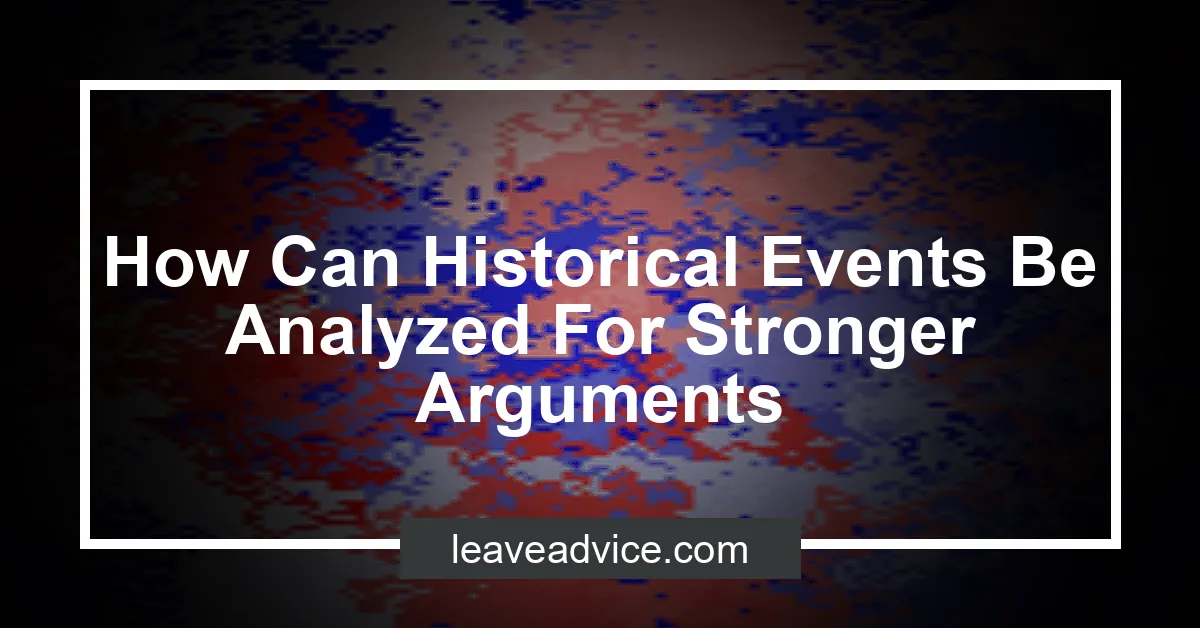How Can Historical Events Be Analyzed For Stronger Arguments


Analyzing historical events is important in strengthening an argument because it provides evidence and context to support the claims being made. Historical events can offer examples, patterns, and correlations that can be used to back up the argument being presented.
By examining the past, it is possible to provide a solid foundation for the argument and demonstrate its validity. Historical events can be analyzed to strengthen an argument based on the evidence and insights they provide into similar situations or circumstances.
Check out this Youtube video: “Generating EVIDENCE for the Argument Prompt (AP Lang Q3)” and learn how historical events can be analyzed to strengthen an argument in academic writing.
Understanding the Historical Context
Defining historical events and their relevance to current arguments
Historical events serve as a foundation for our present-day discussions and provide a context for examining contemporary issues. For instance, understanding the Civil Rights Movement in the 1960s sheds light on the ongoing struggle for racial equality today.
It provides a framework to dissect the evolution of social justice movements and their impact on current societal norms, laying a strong foundation to strengthen arguments for equality and fairness.
The importance of considering different perspectives and interpretations of historical events
Considering diverse viewpoints and interpretations of historical events enhances the depth and credibility of our arguments. By acknowledging multiple perspectives, such as those of marginalized groups or contrasting political factions, we gain a more comprehensive understanding of historical occurrences.
For example, examining the American Revolution from the viewpoints of British loyalists and Native American tribes offers a well-rounded comprehension of its impact beyond patriotic narratives. Embracing varied interpretations enriches the depth of our arguments and fosters a more inclusive understanding of history.
Researching Historical Events
Identifying reliable sources for historical research
Identifying reliable sources for historical research is crucial for ensuring the accuracy and authenticity of the information. Websites such as Founders Online and History by Era, along with resources provided by the National Archives and Records Administration, are excellent sources for historical research.
The National Congress of American Indians and Public Papers of the Presidents also offer valuable insights into historical events.
Evaluating the credibility of historical sources
When evaluating the credibility of historical sources, it is essential to consider the author’s expertise, the publication’s reliability, and the source’s relevance to the topic. For instance, nonfiction books are generally viewed as trustworthy sources, but it is important to ensure that the author’s credentials and the accuracy of the information are verified.
Additionally, letters and firsthand accounts from individuals directly involved in historical events often provide credible insights.
Utilizing primary and secondary sources for historical analysis
The utilization of primary and secondary sources is fundamental in conducting thorough historical analysis. Primary sources, including diaries, interviews, and government documents, offer firsthand experiences and original materials from the time period under study.
On the other hand, secondary sources, such as analyses and interpretations of historical events, provide additional context and perspectives. By integrating both primary and secondary sources, a comprehensive historical analysis can be achieved.
| Primary Sources | Secondary Sources |
|---|---|
| Diaries | Historical analyses |
| Interviews | Interpretations of events |
| Government documents | Synthesized perspectives |
Incorporating a variety of primary and secondary sources enables a more holistic understanding of historical events and strengthens the argument based on historical evidence.
Analyzing Cause and Effect
Historical events have a profound impact on present-day arguments by providing a backdrop of evidence and context. For instance, the Civil Rights Movement in the 1960s is a critical historical event that shapes discussions on racial equality and human rights today.
It serves as a powerful reference point to support arguments for social justice and equality. Likewise, examining the impact of World War II on global power dynamics can significantly enhance debates on international relations, diplomacy, and world politics.
These historical events serve as pillars of evidence, lending strength to arguments and shaping contemporary perspectives and ideologies.
Causal relationships between historical events and contemporary issues can be identified through thorough analysis and critical thinking. For instance, the Great Depression of the 1930s had a causal relationship with the rise of social welfare programs and government interventions in the economy.
This causal link forms the foundation for discussions on economic policies, poverty alleviation, and social safety nets in modern societies. Similarly, the French Revolution and its aftermath laid the groundwork for the formation of democratic ideals and governance systems, providing a causal relationship that underpins debates on political structures and citizen rights in present-day contexts.
| Historical Event | Contemporary Impact |
|---|---|
| The Civil Rights Movement | Shaping discussions on racial equality and human rights, influencing modern perspectives on social justice |
| World War II | Impacting global power dynamics, influencing contemporary debates on international relations |
| The Great Depression | Contributing to the development of social welfare programs and government interventions in modern economies |
| The French Revolution | Laying the groundwork for democratic governance systems, shaping present-day discussions on political structures |
These examples demonstrate how historical events can be analyzed to strengthen arguments by providing tangible links between past occurrences and present-day issues, enriching debates with historical context and evidence. Through the examination of cause and effect, historical events serve as valuable resources for building robust and compelling arguments that resonate with contemporary society.
Historical events have a profound impact on present-day arguments, shaping contemporary perspectives and ideologies through tangible connections and evidence. The identification of causal relationships between historical events and contemporary issues provides a framework for understanding the profound influence of the past on the present.
By analyzing cause and effect, historical events become crucial components in strengthening arguments and enriching discussions in modern discourse.
Recognizing Patterns and Trends
Identifying recurring themes in historical events
One of the recurring themes in historical events is societal migration, where societies migrate due to factors such as political instability, economic opportunities, or environmental changes. This can be seen in the migration patterns of civilizations across the centuries, shaping cultural and societal dynamics.
Analyzing historical patterns to support arguments
Historical patterns can be analyzed to support arguments by examining the evolution of governmental structures, societal norms, and economic systems over time. For instance, studying the patterns of government abuse of power can provide insightful evidence to support arguments on the importance of checks and balances in modern governance.
Comparing Historical Events
Historical events provide rich material for strengthening arguments through comparison and contrast. By examining different events, one can draw parallels, identify patterns, and draw insights that can be used to build persuasive arguments.
For example, by comparing the causes and aftermath of the assassination of John F. Kennedy with the 9/11 terror attacks, one can highlight the impact of such events on the nation’s psyche and political landscape, strengthening the argument for increased security measures.
Utilizing historical parallels is a powerful tool for providing context to present-day issues. For instance, drawing parallels between the tensions leading up to World War I and contemporary geopolitical tensions can illustrate recurring patterns in international relations.
This context enriches the understanding of present-day challenges and can reinforce arguments for diplomatic solutions and conflict resolution strategies.
| Comparison | Historical Event 1 | Historical Event 2 |
|---|---|---|
| Causes | JFK Assassination | 9/11 Terror Attacks |
| Impact | National Psyche | Political Landscape |
Incorporating Historical Facts and Statistics
Collecting and integrating relevant historical facts and statistics into arguments
Incorporating historical facts and statistics into arguments involves comprehensive research to gather accurate and significant data. It’s crucial to source information from reputable historical documents, scholarly journals, and verified databases to ensure credibility.
For instance, when discussing the impact of the Industrial Revolution on labor rights, integrating statistics on workforce conditions and historical accounts of labor movements enhances the argument’s validity and persuasiveness.
Using quantitative data from historical events to support claims
Quantitative data from historical events can substantially fortify claims by providing tangible evidence. Statistical data such as demographic shifts, economic indicators, and population trends can be utilized to underscore the scale and impact of historical occurrences.
For example, when evaluating the demographic impact of the Black Death in the 14th century, utilizing quantitative data on population decline and its subsequent social repercussions strengthens the argument and lends weight to the interpretation of historical significance.
Utilizing Historical Examples
To strengthen arguments, citing specific historical examples is crucial. For instance, when discussing the impact of government policies on economic stability, one can refer to the Great Depression of the 1930s, showcasing how the implementation of the New Deal led to significant recovery.
Additionally, demonstrating the relevance of historical events to current debates is essential. By highlighting how the Civil Rights Movement paved the way for contemporary discussions on social justice, one can effectively underscore the significance of historical relevance in current debates.
| Historical Example | Relevance to Current Debate |
|---|---|
| The Great Depression | Impact of Government Policies |
| Civil Rights Movement | Contemporary Social Justice Debates |
By incorporating specific historical examples, arguments gain depth and credibility, offering a strong foundation for any debate or discussion. Furthermore, drawing parallels between historical events and present-day issues enables a better understanding of the context, making arguments more compelling and relevant.
Incorporating Quotes from Historical Figures
Hey folks, let’s talk about using quotes from historical figures to bolster our arguments. When you’re looking to add credibility to your point, there’s nothing like a well-placed quote from someone who’s been around the block.
Take it from Theodore Roosevelt, who said, “Believe you can and you’re halfway there.” That’s a powerful statement that can really elevate your argument. When you bring in the words of someone like Roosevelt, you’re tapping into their authority and experience, which can give your argument a real boost.
Now, let’s delve into analyzing the wisdom and insights of historical figures to support contemporary issues. Think about it, when you quote renowned figures like Ralph Waldo Emerson, who said, “The only person you are destined to become is the person you decide to be,” you’re not just adding depth to your argument, you’re also showing that timeless wisdom can guide us in current times.
These insights can serve as a beacon, shedding light on present-day challenges and providing valuable perspective.
So, when you’re making your point, remember to sprinkle in some wisdom from the trailblazers of the past. It’s like adding a touch of seasoning to make your argument that much more flavorful and impactful.
Considering Counterarguments from Historical Context
Anticipating counterarguments based on historical events
Analyzing historical events can offer valuable insights into potential counterarguments. For instance, examining past conflicts that appeared unlikely at the time but later unfolded can provide a robust foundation for anticipating opposing viewpoints.
The historical context of World War I, where seemingly isolated events and alliances contributed to a global conflict, demonstrates how unforeseen circumstances can shape counterarguments.
Addressing opposing viewpoints by drawing from historical examples
Drawing from historical examples allows us to effectively address opposing viewpoints. For instance, by referencing the Treaty of Versailles and its repercussions, we can provide a historical basis for understanding conflicting perspectives on international relations and reparations.
Additionally, highlighting the Cuban Missile Crisis and its resolution showcases how historical events can inform meaningful responses to opposing viewpoints, enriching arguments with valuable context.
Examining Ethical and Moral Implications
Considering the ethical and moral lessons from historical events
Historical events offer invaluable ethical and moral lessons that can guide our decisions today. By examining the past, we can learn from the successes and failures of our ancestors, gaining insight into the consequences of certain actions and the impact of ethical choices.
For instance, the civil rights movement in the United States provides a powerful lesson in the perseverance and moral fortitude required to overcome injustice. Such historical examples serve as beacons of inspiration, reminding us of the ethical values that have shaped societies and continue to hold relevance today.
Using historical perspectives to inform ethical arguments
The application of historical perspectives in forming ethical arguments is paramount. By drawing on historical events, we can provide tangible evidence to substantiate our ethical stances.
For example, when discussing the importance of standing up against oppression, historical events like the abolition of slavery or the fight for women’s suffrage serve as compelling illustrations. These narratives not only strengthen our arguments but also resonate emotionally, engaging audiences in a profound manner.
Historical perspectives infuse depth and credibility into ethical discourse, anchoring it in the tapestry of human experience.
Engaging with Anecdotes and Personal Stories
When it comes to enhancing arguments, historical events can serve as powerful tools for making a point. For instance, recall the great historical narrative of the American Revolution.
This story not only captures the struggle for independence but also embodies the resilience and determination of the people. By weaving such narratives into arguments, one can evoke strong emotions and create a compelling case for the significance of perseverance and freedom.
Another engaging example can be found in the historical tale of the Wright brothers’ first successful flight. This remarkable event illustrates how determination and innovation can lead to groundbreaking achievements.
By integrating such stories into arguments, one can effectively emphasize the impact of perseverance and groundbreaking ideas, ultimately strengthening the argument being made.
Historical narratives like these not only provide a captivating backdrop to arguments but also offer valuable insights into the human spirit and the power of determination. By connecting with readers through these personal and historical stories, one can establish a relatable and emotional connection, making the overall message more impactful and persuasive.
| Historical Event | Relevance to Argument |
|---|---|
| American Revolution | Emphasizes resilience and determination |
| Wright brothers’ flight | Illustrates the impact of perseverance |
Leveraging Humor and Satire
Humor and satire have the incredible power to shed light on historical events and strengthen arguments in a unique and engaging way. By infusing humor into serious discussions about historical events, readers can connect with the content on a more personal level, making the message more impactful and memorable.
Using humor and satire allows writers to engage readers through comedic elements while delivering a serious point. This approach not only sustains the reader’s attention but also allows them to comprehend complex historical events with ease.
Humor in historical analysis can be leveraged effectively through the use of parody, spoof, and satire. For instance, modern-day interpretations of historical events through popular culture, such as television shows like The Simpsons and South Park, effectively employ satire to shed light on societal issues while entertaining the audience.
Additionally, humor can be used to make tough topics more approachable. It helps in making serious historical events more relatable to the current context, ensuring that the core message is effectively communicated.
Incorporating humor into historical analysis requires understanding the audience’s sense of humor and delivering content that is relevant and engaging. By using real-life anecdotes and relevant humor, writers can humanize historical events and make them more accessible to a wider audience.
It’s important to note that when leveraging humor and satire to shed light on historical events, writers should be mindful of the balance between entertainment and the serious nature of the topic. This balance is crucial to ensure that the message is conveyed effectively without diminishing the significance of the historical event.
Humor and satire can be powerful tools for analyzing historical events and strengthening arguments. When used appropriately, they not only engage the audience but also make complex historical topics more approachable, leading to a deeper understanding of the subject matter.
Internal Links to Historical Resources
In today’s digital age, it’s crucial to provide internal links to historical documents, artifacts, and resources as a means of enriching the reader’s understanding of an argument. By strategically incorporating these internal links within the content, readers can delve deeper into the historical context, reinforcing the credibility and robustness of the argument presented.
These internal links serve as gateways to further exploration, enabling individuals to gain insights from authentic historical sources.
For instance, when discussing the impact of the Industrial Revolution on labor practices, linking to primary sources such as workers’ diaries or newspapers from that period can offer firsthand perspectives, bolstering the argument with authentic voices from history. Similarly, guiding readers to explore historical events relevant to the argument provides an opportunity for them to gain a comprehensive understanding of the context, strengthening their engagement and appreciation of the subject matter.
By utilizing internal links to historical resources, we are not just conveying information – we are creating an immersive experience for the readers, allowing them to connect with history on a deeper level and enhancing the overall credibility and persuasiveness of the argument at hand.
Addressing Ethical Considerations in Historical Analysis
Discussing the ethical responsibilities of using historical events in arguments
When using historical events in arguments, it is crucial to uphold ethical responsibilities. This entails ensuring that the representation of historical events is accurate and unbiased.
As responsible historians, it is imperative to critically analyze and interpret historical facts without distorting their essence. Ethical considerations emphasize the importance of presenting a balanced perspective that incorporates multiple viewpoints, allowing for a comprehensive understanding of the historical event.
By maintaining ethical responsibilities, historians contribute to the preservation of truth and integrity in historical discourse.
Avoiding the manipulation or misrepresentation of historical facts for persuasive purposes
Historical facts should never be manipulated or misrepresented for persuasive purposes. It is unethical to cherry-pick information or alter historical narratives to suit a specific agenda.
Instead, historical analysis should focus on presenting an objective and authentic account of events, acknowledging complexities and nuances. By avoiding manipulation or misrepresentation, historians uphold the integrity of historical knowledge and contribute to fostering informed discussions based on factual accuracy.
This ethical approach ensures that historical events are analyzed and presented with the utmost respect for truth and authenticity.
| Ethical Responsibility | Manipulation of Historical Facts |
|---|---|
| Accurate representation of events | Avoiding cherry-picking and distortion |
| Balanced perspective | Upholding factual integrity |
| Preservation of truth and integrity | Upholding factual integrity |
Addressing ethical considerations in historical analysis is essential for upholding the integrity and credibility of historical discourse. By embracing ethical responsibilities and avoiding manipulation or misrepresentation of historical facts, historians contribute to the preservation of truth and the promotion of informed discussions rooted in factual accuracy.
Recommended Amazon Products for Analyzing Historical Events to Strengthen an Argument
Here’s a curated list of products that can help you analyze historical events and strengthen your arguments. These recommendations are based on functionality, price, and customer reviews.
Kindle Paperwhite
The Kindle Paperwhite is a great tool for historical research as it allows you to access a wide range of historical books and documents in one device. With its glare-free display and long battery life, you can read for hours without any distractions.
AncestryDNA: Genetic Ethnicity Test
AncestryDNA provides a way to incorporate genetic history into your arguments by tracing your ancestors’ origins and learning about your family’s past. This can add a unique perspective to your historical analyses and strengthen your position.
The Complete Harvard Classics
The Complete Harvard Classics is a comprehensive collection of historical literature, including essays, fiction, and non-fiction works. It provides a wealth of information for anyone looking to deepen their understanding of historical events and integrate diverse perspectives into their arguments.
Encyclopedia of World History
The Encyclopedia of World History is an invaluable resource for researchers, offering a comprehensive overview of global historical events and their impact. It provides detailed information that can help you strengthen your arguments with well-researched facts and statistics.
History: From the Dawn of Civilization to the Present Day
This comprehensive book covers a wide range of historical events, providing a thorough analysis of different time periods and their significance. It offers a wealth of information to support and enhance your arguments with well-researched examples and insights.
Top Recommended Product for Analyzing Historical Events to Strengthen an Argument
If you’re looking for the best solution for analyzing historical events to strengthen your arguments, we highly recommend the Kindle Paperwhite. Here’s why:


The Kindle Paperwhite provides a convenient way to access a wide range of historical literature and documents in one compact device, allowing for in-depth research and analysis. The device’s long battery life and glare-free display ensure that you can read for extended periods without any distractions, making it an ideal tool for historical exploration.
With its extensive library of historical resources, the Kindle Paperwhite offers a wealth of information to enhance your understanding of historical events and provide strong support for your arguments.
Ready to enhance your arguments with historical insights and evidence? Check out the Kindle Paperwhite today for the best results!


Here’s a table comparing the pros and cons of each recommended product:
| Product | Pros | Cons |
|---|---|---|
| Kindle Paperwhite | Wide range of historical books and documents, glare-free display, long battery life | May be less suitable for those who prefer physical books |
| AncestryDNA: Genetic Ethnicity Test | Traces ancestors’ origins, provides unique perspective | Limited to genetic history |
| The Complete Harvard Classics | Comprehensive collection of historical literature, diverse perspectives | Large physical set may require significant space |
| Encyclopedia of World History | Comprehensive overview of global historical events, well-researched facts | May be more academic in nature |
| History: From the Dawn of Civilization to the Present Day | Thorough analysis of historical events, well-researched examples | Physical book format may be less convenient |
Conclusion
Analyzing historical events provides valuable evidence to support an argument. By examining past events, individuals can find examples and patterns that reinforce their position and provide credibility to their claims.
This allows for a stronger and more convincing argument to be made.
Additionally, historical events offer context and perspective to the argument being presented, giving it a broader and deeper understanding. Understanding the historical background of an issue allows for a more comprehensive analysis and interpretation of the present situation, making the argument more well-informed and robust.
Moreover, historical events can provide comparisons and contrasts that can strengthen an argument. By drawing parallels between past events and the current issue, individuals can illustrate the significance and relevance of their argument, making it more persuasive and impactful.
Analyzing historical events adds depth and substance to an argument, making it more compelling and convincing.
Frequently Asked Questions
How should historical events be analyzed?
What is Historical Analysis?
How do you analyze historical sources?
How do you evaluate a historical argument?
What makes a strong historical argument?
What are the 4 steps to creating a historical argument?
What do historians use to support their argument?
How do you analyze a historical event?
Reference Links
- https://www.cnn.com/2023/09/27/politics/takeaways-republican-debate/index.html
- https://plato.stanford.edu/entries/history/
- https://www.npr.org/sections/health-shots/2020/04/11/815573198/how-stories-connect-and-persuade-us-unleashing-the-brain-power-of-narrative
- https://link.springer.com/article/10.1057/ip.2014.40




